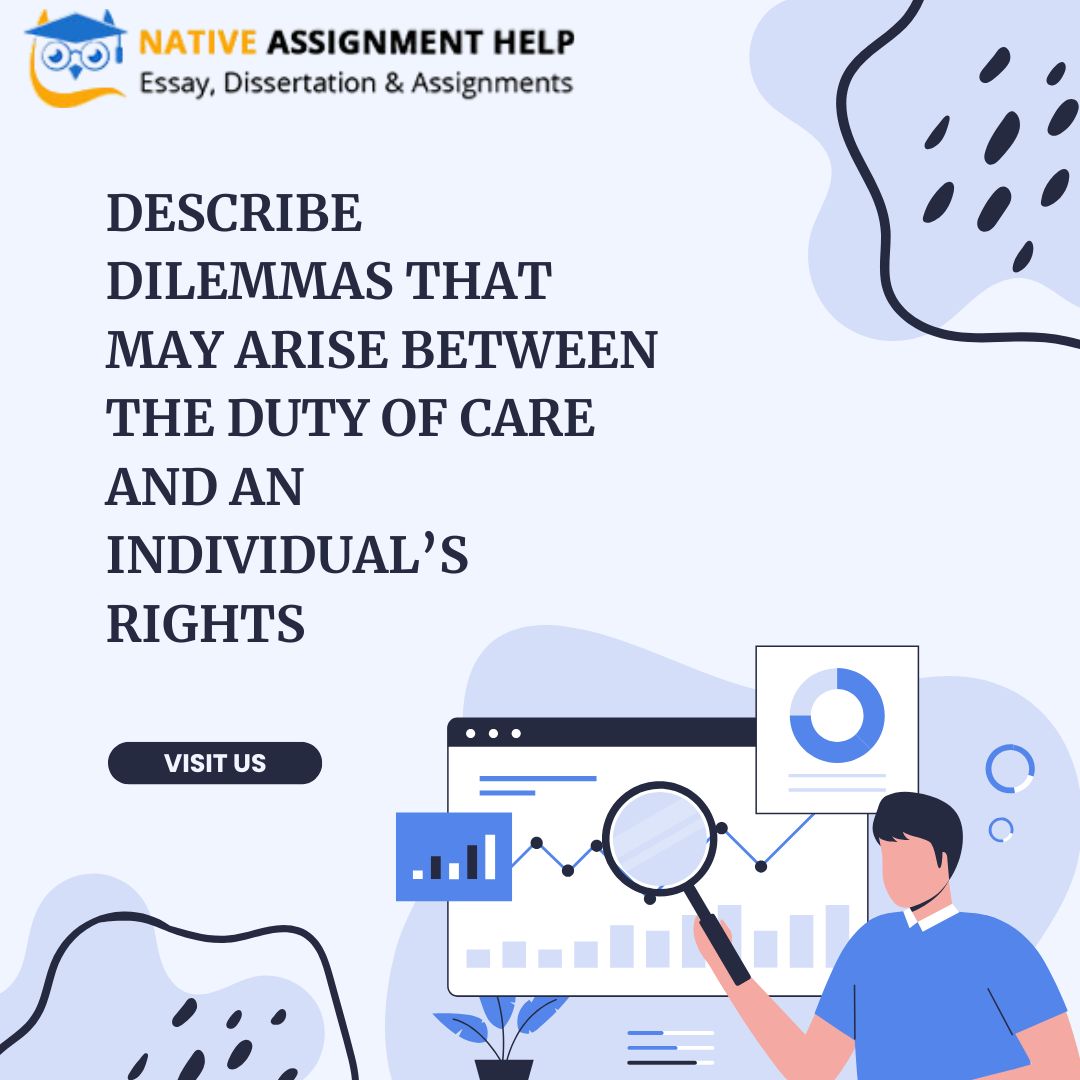Exploring Dilemmas Between Care Duties and Individual Rights in Health & Social Work

Strong 8k brings an ultra-HD IPTV experience to your living room and your pocket.
Introduction
The intersection of care duties and individual rights is a critical issue in the field of health and social work. As professionals, workers are tasked with providing the best care for those in need, while simultaneously respecting their autonomy and individual rights. However, this balance is not always straightforward and can lead to significant ethical and legal dilemmas. For example, workers often face situations where they must describe dilemmas that may arise between the duty of care and an individual’s rights, such as when a patient refuses treatment that could save their life. This article explores the complex relationship between care duties and individual rights, providing insight into the challenges faced by professionals and offering approaches for managing these dilemmas.
Understanding Care Duties
Care duties refer to the responsibilities that health and social care professionals have toward their clients or patients. These duties often arise from ethical principles and laws designed to ensure that individuals receive appropriate care, attention, and protection.
In health and social work, care duties are typically framed by various ethical frameworks, such as beneficence (doing good), non-maleficence (avoiding harm), and justice (fairness and equity). These frameworks guide the professionals in determining the best course of action when providing care.
Examples of care duties include ensuring that patients receive the necessary medical treatment, helping individuals with daily living tasks, and protecting vulnerable individuals from harm or neglect. These duties are essential, as they ensure the well-being of individuals, particularly in vulnerable situations.
What Are Individual Rights?
Individual rights, in the context of health and social work, refer to the personal freedoms and entitlements that a person holds. These rights are grounded in laws and ethical principles that protect individuals from abuse, discrimination, or unwanted intervention. Rights include autonomy (the right to make decisions about one's own life and health), privacy, and the right to refuse care or treatment.
Autonomy is a central concept in individual rights. It is the idea that individuals have the freedom to make choices about their own bodies and lives. This can include decisions about healthcare, such as refusing a treatment or selecting a preferred course of care. While autonomy is a fundamental right, it can sometimes conflict with the need for care, especially when a person’s decisions might lead to harm or when they are unable to make decisions for themselves.
The Intersection of Care Duties and Individual Rights
In practice, care duties and individual rights often intersect, sometimes leading to conflicts. For example, a healthcare provider might feel that a patient needs a certain treatment to survive, but the patient refuses it, asserting their right to autonomy. This creates a dilemma: should the professional respect the individual’s right to refuse care, or should they override that decision to save the person’s life?
Case studies often illustrate these types of dilemmas. For instance, an elderly person might refuse treatment due to fear of hospitalization, but healthcare professionals may believe that the person’s health could deteriorate without intervention. These situations require a careful balancing act.
Legal and Ethical Challenges
There are significant legal and ethical challenges when dealing with dilemmas between care duties and individual rights. Legally, healthcare providers may face repercussions if they do not respect an individual’s rights, especially in cases where a person is mentally competent and capable of making decisions. However, failing to intervene when someone’s health is at risk may also lead to legal consequences, such as charges of neglect.
Ethically, the dilemma becomes even more complicated. Health and social workers must constantly weigh the importance of respecting autonomy with the obligation to do no harm and act in the best interest of the individual. Balancing these two principles is not always clear-cut, especially when the individual’s decision-making capacity is in question.
Balancing Care and Rights: A Delicate Dance
Striking a balance between care duties and individual rights requires a nuanced approach. One strategy involves engaging in open communication with patients and their families to understand their wishes and concerns. Care providers must take time to explain the risks and benefits of different treatment options, ensuring that individuals are fully informed.
Another key approach is involving interdisciplinary teams, including ethicists and legal experts, in complex cases. These teams can provide valuable insights and help healthcare workers navigate difficult decisions.
The Role of Health and Social Workers
Health and social workers play a central role in navigating the tension between care duties and individual rights. These professionals must be well-trained in both ethical reasoning and legal frameworks to make informed decisions. They also need strong communication skills to foster trust and cooperation with patients and families.
Training programs and ongoing professional development can help workers stay updated on best practices and ethical standards. Providing these resources is essential for ensuring that healthcare providers are equipped to handle dilemmas effectively.
Case Study 1: End-of-Life Decisions
One of the most poignant dilemmas in healthcare involves end-of-life decisions. For instance, when a terminally ill patient refuses life-prolonging treatment, healthcare providers must respect the patient’s wishes, but this often comes with moral and emotional challenges.
Balancing the patient's autonomy with the care provider's duty to preserve life is one of the most difficult ethical dilemmas in healthcare. Professionals must navigate these situations with empathy, ensuring that the patient’s wishes are respected while also providing necessary support.
Case Study 2: Mental Health and Autonomy
In mental health care, respecting autonomy can become especially challenging. Patients with mental health issues may not always be in a position to make fully informed decisions about their care. In these cases, involuntary treatment may be necessary to prevent harm. However, this raises questions about the ethics of overriding an individual's right to autonomy.
Professionals must weigh the risks and benefits of treatment and make decisions that prioritize the well-being of the individual, even when this conflicts with their personal preferences.
Cultural Perspectives on Care and Rights
Cultural factors also play a significant role in shaping the balance between care duties and individual rights. In some cultures, family members may hold a significant decision-making role, while in others, individual autonomy is prioritized. Understanding these cultural differences is crucial for healthcare providers to navigate complex ethical issues.
The Impact of Technology on Care and Rights
Advances in medical technology present new ethical challenges. For instance, the use of artificial intelligence in diagnosing and treating patients raises concerns about patient privacy and the security of personal data. Healthcare providers must navigate these technological advances while still respecting patient rights and ensuring that care decisions are made in the patient’s best interest.
Navigating Complex Family Dynamics
Family dynamics often play a role in dilemmas related to care and individual rights. Family members may want to make decisions on behalf of their loved ones, which may conflict with the patient’s own wishes. Health and social workers must work with families to ensure that the individual’s rights are upheld, while also considering the family's emotional needs and concerns.
The Role of Policy in Guiding Care and Rights
Policies and guidelines play an essential role in resolving dilemmas between care and individual rights. Clear policies provide guidance on how professionals should act in different situations, ensuring that ethical standards are maintained. These policies also help protect both the individuals receiving care and the professionals providing it.
Best Practices in Health and Social Work
To navigate these dilemmas, health and social workers should adhere to key principles such as respecting patient autonomy, providing informed consent, and ensuring that care decisions are made in the best interest of the individual. Policies should be regularly reviewed and updated to reflect changing legal and ethical standards.
Conclusion
The dilemmas between care duties and individual rights are complex and require careful consideration. Health and social workers must navigate these challenges with empathy, knowledge, and clear ethical principles. By fostering communication, providing training, and adhering to legal and ethical standards, professionals can ensure that individuals receive the best care while respecting their rights.
FAQs
What happens if a healthcare provider ignores a patient’s rights?
Ignoring a patient’s rights can lead to legal consequences and damage trust between healthcare providers and patients.
How do healthcare professionals balance autonomy with the need for care?
By engaging in open communication, seeking interdisciplinary input, and considering ethical principles like beneficence and non-maleficence.
Why is cultural awareness important in healthcare?
Cultural differences affect how care and rights are viewed, and understanding these differences ensures that care is provided in a respectful and effective manner.
Can a family member make decisions for a patient?
In some cases, yes, especially if the patient is unable to make decisions for themselves. However, patient autonomy should always be prioritized when possible.
How does technology impact care and individual rights?
Technology can enhance care but also raise concerns about privacy and security, requiring careful ethical consideration to balance innovation with patient rights.
Note: IndiBlogHub features both user-submitted and editorial content. We do not verify third-party contributions. Read our Disclaimer and Privacy Policyfor details.


